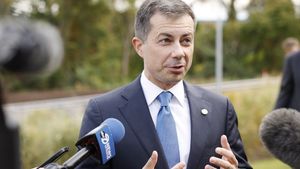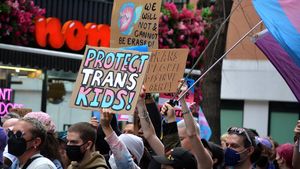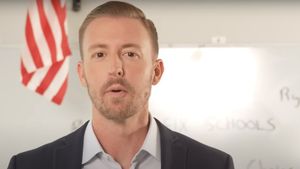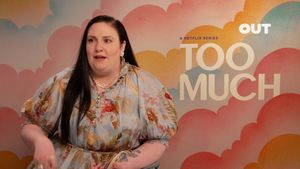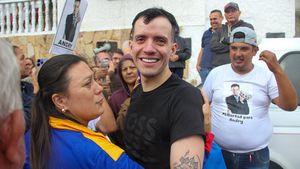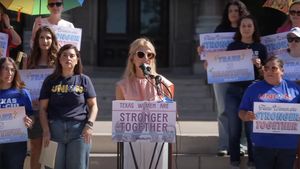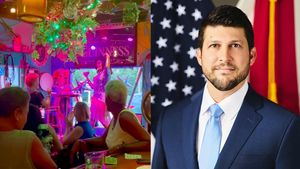Treatment GuideJust DiagnosedSex & DatingAfrican AmericanStigmaAsk the HIV DocPrEP En EspañolNewsVoicesPrint IssueVideoOut 100
CONTACTCAREER OPPORTUNITIESADVERTISE WITH USPRIVACY POLICYPRIVACY PREFERENCESTERMS OF USELEGAL NOTICE
© 2025 Pride Publishing Inc.
All Rights reserved
All Rights reserved
Scroll To Top
By continuing to use our site, you agree to our Privacy Policy and Terms of Use.
When Linda H. Scruggs was 13 weeks' pregnant with her son in 1990 a routine prenatal screening revealed she was infected with HIV. This news was devastating enough on its own for her, she says, without the added burden of the way the people at the Baltimore obstetric clinic broke it to her. Instead of returning to receive the results from the same pretest counselor she had seen before'a woman who, like her, was African-American'she was led to a room where three unfamiliar white male doctors announced her diagnosis. The counselor sat off to the side on a trash can. In a manner that Scruggs describes as 'very unempathetic' and 'high-pressure,' the doctors advised that she should immediately go downstairs to the clinic and terminate her pregnancy. Otherwise, they said, she and her baby would both likely die after three years. They said she had 30 minutes to make up her mind, since it was 4:30 on the afternoon before Thanksgiving and the clinic would be closing early. Instead, Scruggs left the hospital. Since she had been a survivor of incest, rape, drug use, and literacy problems, she knew she couldn't let outside forces try to control her decision about such an important matter. Aside from the emotional trauma, the unfortunate fallout of the incident was the loss of trust Scruggs experienced in the physicians at the clinic, although she did continue to let them see her through her pregnancy. Her trust eroded so much that when they offered to enroll her in what would eventually become the landmark study on AZT that would prove the drug could prevent mother-to-child transmission of HIV, she didn't accept. Fortunately, Scruggs's son is HIV-negative. But the fact remains that the system that should have been in place to help people like her'both in terms of HIV prevention and proper care'was broken. And 16 years later, it still is. 'We know that current HIV prevention campaigns are not working for African-American women,' says David Harvey, executive director of AIDS Alliance for Children, Youth, and Families. 'They're not working because'and not to make this a simplistic explanation'they're not culturally relevant to the real, day-to-day lives of African-American women.' 'In the earliest stages of the AIDS epidemic, there is no doubt that the federal government was negligent in addressing HIV and AIDS, particularly when it came to the gay community,' Harvey adds. 'Fast-forward to 2006, and I would say that history repeats itself. The U.S. government is negligent in addressing HIV and African-Americans. It's simply unacceptable. It's almost as if we have not learned our lesson here.' AIDS Alliance, based in Washington, D.C., is hoping to repair the cracks in the system far too many African-American women are falling through. In January, for example, the organization announced the creation of what it is calling the Black Women's AIDS Initiative. The campaign will bring together numerous lead researchers to study the AIDS epidemic among black women to help shape future policy recommendations to the federal government. AIDS Alliance represents all groups that receive Ryan White Title IV funding, which is federal money earmarked for HIV services targeting women and their families. As another part of the initiative, the agency's leaders hope to retool existing prevention and care programs within the Title IV system to better serve the needs of black women. AIDS Alliance has received a $50,000 start-up grant from the Ford Foundation and hopes to collect $2 million for the initiative over the next year from the federal government and private foundations. They hope that eventually the policy directives will lead not only to rechanneled money for HIV programs that target black women but also the flow of new federal dollars. The leaders of AIDS Alliance point to myriad troubling statistics as the catalyst for the initiative. AIDS is the number 1 cause of death for African-American women between 25 and 34. Black women account for two thirds of new AIDS cases among women despite being only 12% of the overall female population. Per capita, they receive AIDS diagnoses at a rate 25 times higher than that of white women. 'Why are African-American women being infected with HIV at such hugely disproportionate rates? Believe it or not, the CDC and our federal government can't answer that question,' Harvey says. Harvey says he hopes the initiative's research will provide the answers. The researchers will study the social and economic issues that contribute to the statistics, how to better prevent new infections, and what kinds of social and health care systems need to be in place to respond to the needs of African-American women. Scruggs agrees and hopes the study results will send a wake-up call where it needs to be sounded. 'I know the government has not called this a state of emergency,' she says, 'but I think some of these research questions may push the government to look at this beyond just a state of urgency'that this really is overwhelming the African-American community.' Rose Todd-Stanford, a 47-year-old woman who was diagnosed with HIV in 1993, is an example of someone who may have benefited from HIV prevention messages that were more effective. She was infected, she says, by a man she trusted enough not to use a condom. And she realizes there are too many other women who mistakenly allow themselves to believe the same thing. 'I feel strongly that we need to enhance the condom usage message,' she says. 'I think we need to empower women. We as black women still have a lot of self-esteem issues. For instance, I'm sure that black women tend to be heavier than white women. And so when you're heavier and you're feeling a little depressed about your shape, and then you have a guy who wants to give you some attention, it's the attention that becomes more of a priority than who you're getting the attention from.' Todd-Stanford, who recently moved to Chesapeake, Va., from Cincinnati, says she has trouble relating to HIV prevention messages that come from glamorous actresses with ideal physiques. She would prefer hearing from someone who more resembles her. Yvette Ogletree points out that she represents what can happen when women don't realize they are at risk. When she received her HIV diagnosis, it was a complete surprise to her because she felt she didn't fit any of the typical stereotypes of someone who gets HIV. 'I'd been married, have two kids, the little house, and the picket fence,' the 35-year-old San Diego resident says. 'I had never been an IV drug user, and I wasn't a prostitute. I wasn't any of these things, these stereotypes that people have.' Ogletree says she would like to see all doctors discussing HIV with their patients, particularly gynecologists. However, she acknowledges that African-Americans in particular have long-held mistrust of the medical establishment. With that said, though, she'd like to see greater outreach within her community from black HIV-positive women themselves. As for Scruggs, she wishes she could go back in time and receive her diagnosis from a familiar person who was her same race and gender, not from three insensitive strangers. After her diagnosis, she became a women's health advocate, which eventually landed her a job at AIDS Alliance, where she is now deputy director of programs. She also went on a successful crusade to alter how testing is done at the clinic where she received her diagnosis. 'We're 25 years into the epidemic, but unfortunately we're still very small-minded,' she says of the ways HIV prevention and AIDS care approaches black women. 'When you're the one experiencing the diagnosis, you're very alone.'
Recommended Stories for You
From our Sponsors
Most Popular
BREAKING NEWS: Trump admin moves to end federal HIV prevention programs
March 18 2025 6:10 PM
Grindr is reminding us why jockstraps are so sexy and iconic
May 02 2025 5:36 PM
Trump's orders prompt CDC to erase HIV resources
January 31 2025 5:29 PM
Celebrating Black History Month with our annual African American issue
February 01 2025 3:28 PM
Tyler TerMeer vows to continue to fight for health care for all
January 28 2025 3:00 PM
Discover the power of Wellness in your life
March 26 2025 12:41 PM
Plus: Featured Video
More Videos
0 seconds of 3 minutes, 18 secondsVolume 0%
Press shift question mark to access a list of keyboard shortcuts
Keyboard Shortcuts
Shortcuts Open/Close/ or ?
Play/PauseSPACE
Increase Volume↑
Decrease Volume↓
Seek Forward→
Seek Backward←
Captions On/Offc
Fullscreen/Exit Fullscreenf
Mute/Unmutem
Decrease Caption Size-
Increase Caption Size+ or =
Seek %0-9
Next Up
Pride Today | Andrew Mitch is Showing Plenty of Skin as an Out and Proud Gay Country Singer
01:41
Copied
Live
00:00
03:18
03:18
Latest Stories
The Talk: Starting the conversation
July 25 2025 4:47 PM
BREAKING: Supreme Court rules to save free access to preventive care, including PrEP
June 27 2025 10:32 AM
HRC holds 'die-in' to protest Trump health care cuts
April 28 2025 2:11 PM
Season 4 of The Switch on resilience & radical self-love returns this spring
March 26 2025 12:20 PM
Lexi Love comes out as HIV+ after Trump deletes federal resources
January 23 2025 11:23 AM
A camp for HIV-positive kids is for sale. Here's why its founder is celebrating
January 02 2025 12:21 PM
Thanks to U=U, HIV-positive people can live long, happy, healthy lives
July 25 2025 2:37 PM
“I felt like a butterfly”: Niko Flowers on reclaiming life with HIV
July 23 2025 12:22 PM
1985: the year the AIDS crisis finally broke through the silence
June 26 2025 11:24 AM
Trump admin guts $258 million in funding for HIV vaccine research
June 03 2025 3:47 PM
Two right-wing Supreme Court justices signal they may uphold access to PrEP and more
April 21 2025 4:10 PM
Broadway's best raise over $1 million for LGBTQ+ and HIV causes
April 03 2025 7:15 PM
Jess King is here to help you live your happiest, healthiest life yet
March 24 2025 4:35 PM
Dancer. Healer. Survivor. DéShaun Armbrister is all of the above
July 02 2025 8:23 PM
VIDEO: A man living with HIV discusses his journey to fatherhood
June 10 2025 4:58 PM
500,000 Children at Risk: PEPFAR Funding Crisis
April 08 2025 3:51 PM
The Talk Season 5 premieres this spring with HIV guidance for the newly diagnosed
March 26 2025 1:00 PM
Gerald Garth is keeping people of color happy and healthy through trying times
March 11 2025 3:38 PM
Plus nominated for 2025 GLAAD Media Award
January 22 2025 12:42 PM







